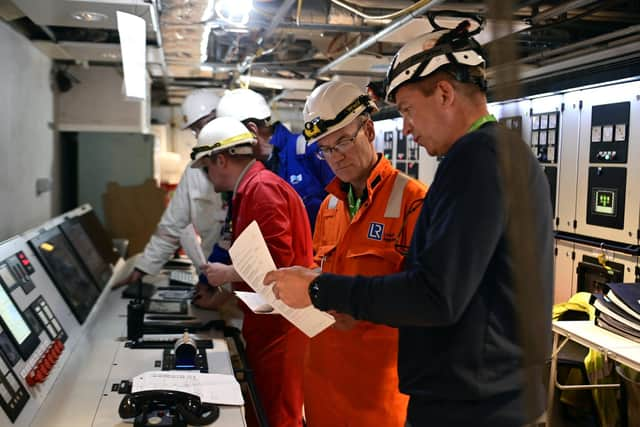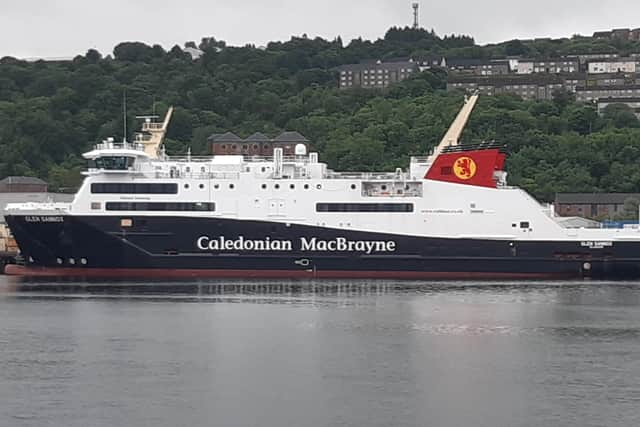Exclusive:Ferguson Marine ferry fiasco: Expired equipment warranty threatens further Glen Sannox delay
The hugely late and over budget ferry Glen Sannox faces potential further delays and cost increases because its equipment warranties have expired, Scotland on Sunday has learned.
The Ferguson Marine shipyard has admitted it will have to rely on “supplier goodwill” when problems are found, which ferry operator CalMac said is likely during two months of trials before the vessel is due to enter service next spring.
Advertisement
Hide AdAdvertisement
Hide AdCalMac chief executive Robbie Drummond has also warned that the lack of warranties could cause difficulties in getting parts and engineers to fix problems as suppliers were no longer obliged to step in. Fergusons was unable to say how much contingency funding would be required.


The latest threatened setback in the long-running ferry saga comes a month after The Scotsman revealed that Glen Sannox was not now expected to be handed over to CalMac until February rather than December, risking it not being ready for the start of the busy summer season in April.
The ferry and its unnamed sister vessel 802 are due to be deployed on the main Arran route to Brodick six years late and more than three times over their original combined £97 million budget. They will be CaMac’s second largest vessels.
Drummond said: "We need to get the vessel in as soon as we can, because clearly it’s needed for the community of Arran. The Arran services have been seriously disrupted. Those two vessels [Glen Sannox and 802] were designed eight years ago to deliver the greater capacity and greater resilience for Arran, and that’s what we really need.
“The challenge is if we don’t get [Glen Sannox] in for the summer season, then summer 2024 may prove to be challenging as this year has been...but we have contingency plans.”


Drummond said CalMac would need at least two months for trials “to ensure the vessel is operating effectively”, but these would take place without the reassurance of equipment warranties to ensure the glitches which they were expected to throw up were resolved.
He said: "When you procure a vessel, usually all the equipment comes with a one to two year manufacturers’ warranty, which applies to all the mechanical, electrical and software systems. Those will have gone, so Fergusons will have to provide a warranty for 12 months to us, but clearly they need to discharge that through the OEMs [original equipment manufacturers].
"So they’ll need to get access to the OEMs to make sure they will actually support the work that could be required to rectify any issues...because those systems have essentially been lying idle for a number of years.
Advertisement
Hide AdAdvertisement
Hide Ad“Ferries are incredibly complex, so you would expect that a series of warranty claims would be normal. There is a risk this situation is entirely different and that could be more difficult than you might normally have because the equipment has been held in stores for a number of years.”
Drummond said that would “increase the risk that something has occurred”. He added: "The risk is also higher because it is not backed up by a proper OEM warranty, so you are going to have to get the yard to work with suppliers to fix anything.
"Clearly there is a cost attached to providing us with that 12-month warranty and fix anything that transpires. It’s whole systems and how they integrate together that’s the concern.”
Drummond said while the ferry’s equipment was being tested in the Port Glasgow yard, it could not be comprehensively checked until the vessel was at sea. He said: "Getting the vessel out into the water and conducting these trials under full power is very different to operating dockside. You would expect issues to emerge through that process as you put all the systems through their full testing programmes.
"You expect issues to emerge - that would be normal. The risk of issues emerging is perhaps higher than it would be in a normal situation. There is a risk of course [of delayed introduction into service]. If something emerges that has to be fixed, you have to go back to Fergusons.”
Drummond said problems were found while testing both of CalMac’s newest large ferries, Loch Seaforth and Finlaggan, “but these were rectified because they were covered by warranty, so the OEMs had to fix it.
"The challenge we have is that ferries are very small part of the shipping industry, and therefore CalMac is a really small part. So while we are spending significant sums, in shipping industry terms, it is a very small amount. So interrupting your supply chain or sending over your scarce engineers for what are relatively small issues, that’s where goodwill is required.
"All the key manufacturers are not UK, they’re European, so there’s the challenge of bringing in equipment and maintenance engineers. If you haven’t got a contractor warranty that forces you to come across, you are going to rely on goodwill."
Advertisement
Hide AdAdvertisement
Hide AdFerguson Marine Port Glasgow [FMPG] chief executive David Tydeman said: “As part of the handover process on Glen Sannox, we are currently working through the ship to establish operating manuals and lists of all equipment on board. Some of this equipment was purchased by [previous owner] Ferguson Marine Engineering Limited before it entered administration in 2019, and will therefore no longer be covered by the typical 12–24 month warranty provided by suppliers.
“FMPG will fulfil its contractual obligation to support the ship for 12 months after delivery. In the event of equipment failure, where a warranty has expired we will have to either seek supplier goodwill, or pay suppliers for their services. The financial provision for this will not be confirmed until much closer to the final handover date.”
A Scottish Government spokesperson said: “This is a matter for FMPG who are in discussion with the end users of the vessel regarding a number of matters relating to operationalisation, including provision of warranty.”
Comments
Want to join the conversation? Please or to comment on this article.